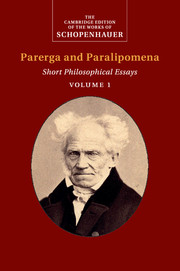Book contents
- Frontmatter
- Contents
- General Editor’s Preface
- Editorial Notes and References
- Introduction
- Notes on Text and Translation
- Chronology
- Bibliography
- Parerga and Paralipomena: Contents
- Preface
- Sketch of a History of the Doctrine of the Ideal and the Real
- Fragments for the History of Philosophy
- On University Philosophy
- Transcendent Speculation on the Apparent Deliberateness in the Fate of the Individual
- Essay on Spirit-Seeing and Related Issues
- Aphorisms on the Wisdom of Life
- Chapter I Fundamental Division
- Chapter II What One Is
- Chapter III What One Has
- Chapter IV What One Represents
- Chapter V Counsels and Maxims
- Chapter VI On the Different Stages of Life
- Versions of Schopenhauer’s Text
- Glossary of Names
- Index
Essay on Spirit-Seeing and Related Issues
Published online by Cambridge University Press: 30 June 2022
- Frontmatter
- Contents
- General Editor’s Preface
- Editorial Notes and References
- Introduction
- Notes on Text and Translation
- Chronology
- Bibliography
- Parerga and Paralipomena: Contents
- Preface
- Sketch of a History of the Doctrine of the Ideal and the Real
- Fragments for the History of Philosophy
- On University Philosophy
- Transcendent Speculation on the Apparent Deliberateness in the Fate of the Individual
- Essay on Spirit-Seeing and Related Issues
- Aphorisms on the Wisdom of Life
- Chapter I Fundamental Division
- Chapter II What One Is
- Chapter III What One Has
- Chapter IV What One Represents
- Chapter V Counsels and Maxims
- Chapter VI On the Different Stages of Life
- Versions of Schopenhauer’s Text
- Glossary of Names
- Index
Summary
Und laß dir rathen,habe
Die Sonne nicht zu lieb unddie Sterne.
Komm, folge mir ins dunkleReich hinab.
Goethe[And you, priestess, take my advice:
Don't love the sun, don't love the stars toomuch.
Come! Follow me below to the dark kingdom!
(Iphigenia inTauris, Act III, scene 1; trans. Frank G.Ryder)]The spectres that were not only banned but ostracizedeverywhere in the all-too-clever past century, indefiance of all previous ages, have beenrehabilitated in Germany during these pasttwenty-five years, as magic was already. Perhaps notwithout good reason. For the proofs against theirexistence were in part metaphysical, based as suchon uncertain ground; and in part empirical, merelydemonstrating that in those cases where noaccidental or intentionally arranged deception hadbeen uncovered, neither had anything existed thatcould have acted on the retina by means ofreflection of light rays, or on the eardrum by meansof vibrations of the air. However, this merelyspeaks against the presence of bodies, which nobody had actuallyclaimed, indeed whose manifestation in the aforesaidphysical manner would nullify the truth of a spiritapparition. For it is already part of the concept ofa spirit that its presence manifests itself to us inanother way than that of a body. What a spirit-seerwho understood and could express himself quite wellwould assert is merely the presence of an image inhis intuitive intellect, completelyindistinguishable from that image which, uponmediation of light and his eyes, is caused bybodies, yet without actual presence of such bodies.The same goes for what is audibly present – noises,tones, and sounds – identical to those produced inhis ear by vibrating bodies and air, but without thepresence or motion of such bodies. This is thesource of the misunderstanding that pervades allthat is said for and against the reality of spiritapparitions. For a spirit apparition presents itselfjust like a bodily appearance; but it is not abodily appearance and is not supposed to be oneeither. This distinction is difficult and calls forexpert knowledge, indeed philosophical andphysiological knowledge. For it is crucial tounderstand that an effect similar to that of a bodydoes not necessarily presuppose the presence of abody.
- Type
- Chapter
- Information
- Schopenhauer: Parerga and ParalipomenaShort Philosophical Essays, pp. 198 - 272Publisher: Cambridge University PressPrint publication year: 2014

